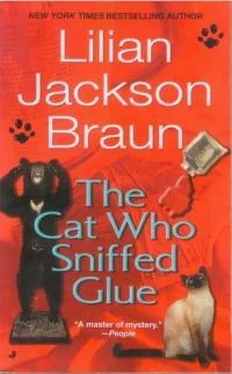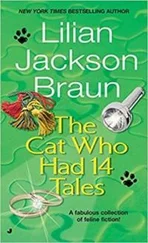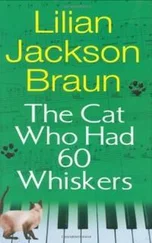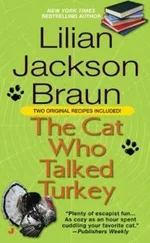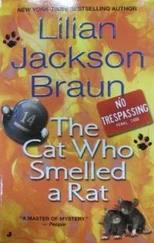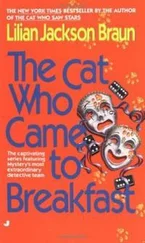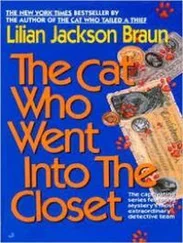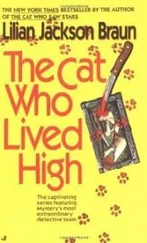"Did he find anything wrong?"
"He said it's all psychological. She's objecting to something in her life-style or environment, and I don't think it's the new wallpaper. In my opinion she's jealous of the interior designer."
"Really?" said Mildred. "How does Koko react to the designer?"
"He ignores her. He's too busy sniffing glue."
Over the coffee Mildred said, "Confidentially, Qwill, is Roger doing all right at the paper?"
"He's doing fine. He has a history teacher's nose for accurate facts, and he writes well."
"I worried about his giving up a good teaching position - with a new baby in the family and Sharon not working. But I guess his generation is more daring than ours."
"Speak for yourself, Mildred. I, for one, like to make daring decisions."
"Have you decided to get married again?" she asked hopefully.
"Not that daring!"
After she said good night, adding that she wanted to be home before dark, Qwilleran moved to a stool at the bar. He had been there before, and Gary Pratt remembered his drink: Squunk water with a dash of bitters and a slice of lemon.
"How do you explain your policy on paper napkins?" Qwilleran asked him.
"Everything costs money," Gary said in a surprisingly high-pitched voice. "The bank stopped giving me free checks, and the gas station stopped giving me free air. Why should I give them free napkins?"
"I admire your logic, Gary."
"The thing of it is, when I kept the dispensers full of napkins they were always disappearing. My customers used them to blow their nose, clean their windshield, and God knows what else."
"You've convinced me! Here's my nickel. I'll take a napkin," Qwilleran said. He nodded toward the mounted bear at the entrance. "I see you've employed a new bouncer."
"That's Wally Toddwhistle's work. He's the best in the business."
"I'm interviewing Wally tomorrow for the paper."
"Mention the Black Bear Caf‚, will you?" Gary said. "Give us a plug. Tell them the hotel is over a hundred years old, with the original bar." He ran a towel over its scarred surface with affection. "My old man let the place run down, but I'm fixing it up. Not too fancy, you know. We get a lot of boaters, and they like the beat-up look."
Qwilleran glanced around the room and noticed boaters with striped jerseys and tanned faces, farmers in feed caps, men and women in business suits, and elderly folks with white hair and hearing aids. All were eating boozeburgers and strawberry pie and looking happy - with one exception. A sandy-haired man seated a few stools down the bar was drinking alone, hunched over his beer in a posture of dejection. Qwilleran noticed he was wearing expensive-looking casual clothes and a star sapphire on his little finger.
"How long has the big sign been on the roof?" Qwilleran asked Gary.
"Since 1900, as far as I can trace it. It's visible from the lake. In fact, if sailors line up the steeple of the Brrr church with the Z in 'Booze,' it'll guide 'em straight through the channel west of the breakwall." He filled an order for the barmaid and returned to Qwilleran. "Some folks in town object to 'Booze' in such big letters, but, the way I see it, it's a friendly word. Boozing means sitting around, talking and taking it easy while you sip a drink. It goes back to the fourteenth century, only it was spelled b-o-u-s-e in those days. I looked it up."
Gary had professional aplomb. His black eyes roamed about the caf‚ constantly, all the while he talked and worked. He would pour a shot of whiskey, greet a newcomer, ring up a tab, nudge a boisterous customer on the shoulder, wipe the bar, mix a tray of martinis for the barmaid, draw a pitcher of beer, caution a masher, wipe the bar again.
"The thing of it is," he explained to Qwilleran, "Brrr is a harbor of refuge for boats, the only one this side of the lake. I want the caf‚ to be a place where everyone can come and feel comfortable and at home." "I understand you're a sailor yourself."
"I've got a catamaran. She's been in a few races. I used to sail with Harley Fitch, but those days are over. Too bad! Harley and David used to come in here a lot, and we'd talk boats. Not David so much; he's a golf nut. Shoots in the low seventies. Ever see Harley's model ships?"
"No, but I've heard about them. Pretty good, I guess."
"I tried to buy one of his America's Cup racers for the cafe, but he wouldn't part with it. The thing of it is, he was getting kind of funny toward the end."
"How do you mean - funny?"
"There was his marriage, for one thing. That was all wrong. But there were other things. When he went to work for the bank, I tried to get a loan to improve this place. If I'm gonna rent the rooms, I gotta put in an elevator and bring everything up to code. All that takes money - a lot of money. His father was president of the bank, you know, and I thought we were good friends and could work out a deal."
The barkeeper moved away to refill a glass. When he returned, Qwilleran said, "Did the loan go through?"
Gary shook his shaggy black hair. "No dice. I was really teed off about that, and I gave it to him straight from the shoulder. We had a row, and he never came in here again... I didn't care. The thing of it is, he was never the same after he came home."
"Came home from where?" Qwilleran asked with a display of innocence. "From college?"
"No, he was, uh... David came home and went into; the bank with his father, but Harley spent a year in the east before he came home."
Qwilleran ordered another Squunk water and then leisurely inquired what Harley was doing in the east.
Gary's black eyes roamed the room. "The family didn't want anybody to know, and people made a lot of wild guesses, but Harley told me the truth. When you get out there on the lake with a blue sky full of sail and only the whisper of a breeze, it's easy to talk. It's like going to a shrink. That was before things turned sour between us, you know. I promised to keep mum about it."
Qwilleran sipped his drink and glanced idly at the backbar with its nineteenth-century carvings and turnings and beveled mirrors.
Gary said, "I didn't say anything about it when the police were here. After the murder they were talking to everybody that knew him."
Qwilleran said, "Do you think Harley's secret mission may have had some bearing on the murder?"
Gary shrugged. "Who knows? I'm no detective."
"Personally," Qwilleran said in his best confidential manner, "I'm not convinced the Chipmunk kids were responsible for the crime, and I think we should do everything we can to bring the real criminals to justice. At the moment I'm wondering if Harley made enemies during his year away from home. Did he get mixed up in gambling or drugs?"
"Nothing like that," said the barkeeper. "I could tell you, I suppose. It doesn't make any difference now that he's dead, and his folks are dead."
Qwilleran's mournfully sympathetic eyes were fixed on Gary's shifting black ones.
Gary said, "But I'd be crazy to tell a reporter. I know you're writing for the paper. Are you digging up some dirt about the Fitches?"
"Nothing of the kind! I'm concerned because Carol and Larry Lanspeak are good people, and I hate to see their boy falsely linked to the murder."
Gary was silent and thoughtful as he wiped the bar for the twentieth time. He glanced around the room and lowered his voice. "Harley's folks said he was traveling out of the country. The thing of it is... he was doing time."
"He was in jail?"
"In prison - somewhere in the east."
"On what charge?"
"Criminal negligence. Car accident. A girl was killed."
"Did Harley tell you this?" Qwilleran asked.
"We were still friendly then, and he wanted to get it off his chest, I guess. It's tough living with a secret in a tight little place like Moose County."
Читать дальше
